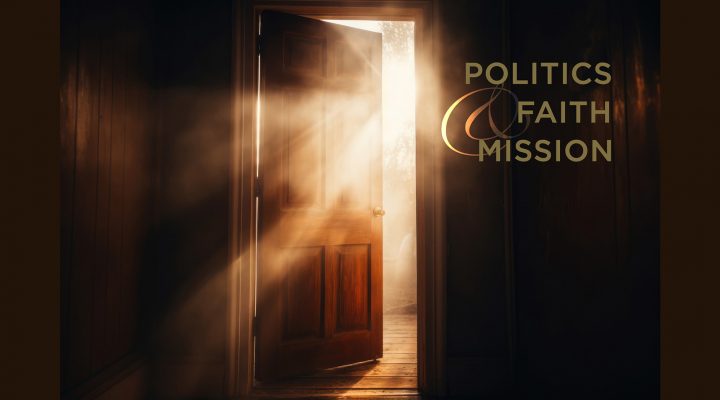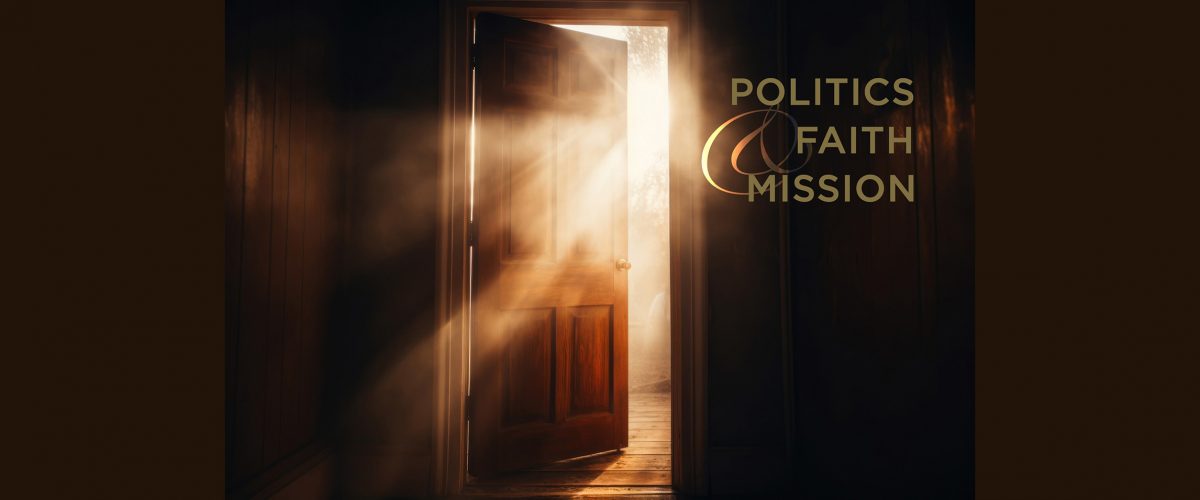One of the most significant questions in this election year revolves around how American Christians reconcile their faith and their politics, and sadly, we often do it badly, trying to shape our faith and the Scriptures to support the political reality we want to achieve rather than the kingdom Jesus came to proclaim. Author and theologian Kaitlyn Schiess leans hard into this history in her most recent book The Ballot and the Bible: How Scripture Has Been Used and Abused in American Politics and Where We Go from Here. Kaitlyn has written for the New York Times, Christianity Today, Relevant and Sojourners, and co-hosts the Holy Post podcast with Skye Jethani and Phil Vischer. It’s a joy to welcome Kaitlyn into this conversation for politics, faith and mission.
Greg Garrett: At its heart, The Ballot and the Bible is a study of hermeneutics, the art of interpreting the Bible. You describe how on a variety of issues across our history people often have applied a political hermeneutic that leads to dueling interpretations or what you characterize as significant misreadings. How can Christians read the Bible responsibly, in a way that takes into account the text and the big issues we want to use the Bible to resolve?

Kaitlyn Schiess
Kaitlyn Schiess: One of the greatest pitfalls in much of our biblical interpretation in politics comes when we expect Scripture to answer our questions, rather than receiving the challenging, comforting or convicting word it brings to us. There’s a good impulse at play here: Christians are presented with a pressing political issue and they go to their Bibles to find guidance. But when we expect Scripture to answer our questions, on the terms that we have set, we tend to miss wider themes, surprising demands and discomforting stories.
We need to learn to go to Scripture — all of it, across the canon and in different genres — and expect to find a word not only for our personal lives but for our public life. We need to learn from a diversity of perspectives, asking what Christians around the world, throughout time and from different backgrounds than us today are hearing in the text. This is also why I focused on history, because I think we also need to be attentive to the hermeneutical habits we inherit, sifting through the good we receive with thanks and the misuse we lament.
GG: Your chapter on Civil War hermeneutics is brilliant and so topical, since Neo-Nazis bearing swastikas marched last week in Nashville, home of the Southern Baptist Convention. Can you talk about some of the bad readings of the Bible from slavery forward to justify racism, and say something about how we might read the Bible as in opposition to racism and prejudice?
KS: There is so much from this period we can learn from, starting with how we tell the story of this history. Often, the history has been told like this: Southern slaveholders had the Bible on their side, while abolitionists in the North had to come up with complicated hermeneutical gymnastics or newfangled theology from Europe to justify their interpretation. This entire understanding of the history leaves out what enslaved and free Black Americans were doing with the Bible. They very often were not doing what slavery defenders did (isolating commands in Scripture and mixing them with their own “plantation” hierarchical ethic) or what white abolitionists were doing (sometimes discarding the Bible, sometimes abstracting away from any specifics in the text and only focusing on themes like love and compassion).
“We don’t need to discard Scripture’s value for our political life just because others have abused it.”
Many enslaved and free Black Americans instead took the Bible to be a liberating text, finding themselves in the story of the Exodus, hearing the judgments in Revelation as judgments against their oppressors, hearing the words of the prophets as directly applicable to their lives. This teaches us that we don’t need to discard Scripture’s value for our political life just because others have abused it. It also teaches us we need to read with the marginalized, we need to read widely across Scripture, and we need to consider not only direct commands or doctrinal teaching but narrative, poetry and apocalypse.
GG: One of my favorite chapters shares your comparison of the ways George W. Bush and Barack Obama used the Bible (and looming over all of this is your early mention of Donald Trump, who being asked at his Washington church photo op if he was holding his own Bible answered, well, “It is a Bible”). Could you summarize for us how these two earlier presidents employed the Bible in their discourse, and how contemporary Republicans (such as Mike Pence) have used biblical references?
KS: I chose these two presidents in part because I think they well represent two very different approaches to faith in public life. Bush tended to use Scripture as a way to appeal to a shared Christian identity, to tell his supporters he was “one of them.” He actually didn’t quote Scripture very often (much less than Obama), and he was more likely to use generic terms for faith and God. He wanted the country to know he was a Christian (and that meant he found comfort and guidance from God), but he also wanted to appeal to a generally religious America, without getting too caught up in doctrinal differences or details.
Obama, on the other hand, tended to use Scripture to appeal to Christianity as the shared moral language of our country. He often told his own party they couldn’t cede Christianity to the right. But he was also much more likely to talk about his own faith in relationship to other faiths.
In his 2009 National Prayer Breakfast speech, he said: “We read from different texts. We follow different edicts. We subscribe to different accounts of how we came to be here and where we’re going next — and some subscribe to no faith at all.” Instead of drawing on faith as something we shared in common (and so downplaying any differences), Obama leaned into difference as a good thing we should deal with honestly.
“Today’s Republicans continue to draw on Christian language as an identity marker.”
Today’s Republicans continue to draw on Christian language as an identity marker, and all politicians are continually liable to use Scripture as helpful rhetoric to punch up their public speech. When Mike Pence misquoted Hebrews 12 in his 2020 RNC speech, saying “Let’s run the race marked out for us. Let’s fix our eyes on Old Glory,” he was drawing on Scripture to lend divine power and weight to his political pitch.
Christians need to be able to discern when Scripture is used either as an identity marker or for rhetorical power.
GG: You cite a number of important writers from fields as diverse as theology, sociology, history and biblical studies. Given the state of American Christianity and the American body politic, could you recommend a few essential contemporary writers and thinkers and tell us why?
KS: I agree with my friend Michael Wear that the political crisis in the American church is first and foremost a spiritual formation crisis, so I highly recommend his work with the Center for Christianity and Public Life and his most recent book, The Spirit of Our Politics.
Jasmine Holmes is a historian doing incredible work making American history accessible to a larger audience, and not only describing the failures of the American church but pointing us toward examples of faithfulness we have ignored.
And I would be remiss if I did not mention my doctoral adviser, Luke Bretherton, whose work on political theology first attracted me to the field. His book Christ and the Common Life is an essential read for people interested not only in the particular failures of this moment but the larger theological work we desperately need.
GG: I wanted to convene this interview series to grapple with white Christian nationalism and with the serious divisions in America during this general election. What are your fears and hopes during this election year? What can you offer us about how we might read Scripture in a way that it shapes us for the better, as I’ve always supposed it was meant to do?
KS: I am not very hopeful about our national election, about the tenor and tone of our national conversation, about the ability for Christians to influence national politics in a healthier way toward good ends. I am very hopeful about the work of faithful people seeking flourishing in their local communities. And I’m extremely hopeful about the return of Christ to make all things new.
Doing this historical research gave me better perspective, I think, about the magnitude of problems we are facing. Christians, even in this country, have faced much more challenging times and found hope in the promise of Christ’s return. Many of them believed in the faith I am clinging to now: that our faithful efforts to seek justice and mercy here and now will be vindicated in eternity, even if they look like failures in the eyes of the world now.

Greg Garrett
Greg Garrett teaches creative writing, film, literature and theology classes at Baylor University. He is the author of two dozen books of fiction, nonfiction, memoir and translation, including the critically acclaimed novels Free Bird, Cycling, Shame and The Prodigal. His latest novel is Bastille Day. He is one of America’s leading voices on religion and culture. Two of his recent nonfiction books are In Conversation: Rowan Williams and Greg Garrett and A Long, Long Way: Hollywood’s Unfinished Journey from Racism to Reconciliation. He is a seminary-trained lay preacher in the Episcopal Church. He lives in Austin with his wife, Jeanie, and their two daughters.
Related from Kaitlyn Schiess
For the Bible tells me so: The Bible and the Civil Rights movement | Opinion by Katilyn Schiess
Schiess shows how politicians use and abuse Scripture to shape history and hermeneutics | Analysis by Steve Rabey
More from this series:
Politics, faith and mission: A conversation with Russell Moore
Politics, faith and mission: A BNG interview series on the 2024 election and the Church
Politics, faith and mission: A talk with Tim Alberta on his book and faith journey
Politics, faith and mission: A conversation with Jemar Tisby
Politics, faith and mission: A conversation with Leonard Hamlin Sr.
Politics, faith and mission: A conversation with Ty Seidule
Politics, faith and mission: A conversation with Jessica Wai-Fong Wong


